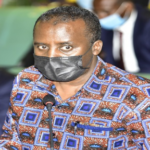Health Minister Sabin Nsanzimana has revealed that, starting from 2025, the government will include cancer treatment and kidney transplants in the community-based health insurance scheme ” Mutuelle de Santé.”
Government plans to include specialised medical services including cancer treatment and kidney transplants in the community-based health insurance scheme (CBHI) commonly known as Mutuelle de Santé, starting from 2025, it has emerged.
Officials from the Ministry of Health and the Rwanda Social Security Board (RSSB) disclosed this on Monday, February 5, while appearing before the Lower House’s Committee on Unity, Human Rights and Fight against Genocide to respond to issues exposed by the report of the National Commission for Human Rights for the fiscal year 2022/2023.
The issues in question as per the report include inadequate access to specialised medical services for people with disabilities and the elderly, as well as some medicines or treatments not covered by Mutuelle de Santé.
Minister Nsanzimana told lawmakers that in partnership with RSSB, they considered expansion of a list of medical services to be covered by Mutuelle de Santé, as some were not covered before because of limited resources in the fund.
“For us as the Ministry of Health, we wish to include all the possible services [in the Mutuelle de Santé health package], but when we consider the capacity of our fund, we realised that some are not possible,” he said, pointing out that the focus was to increase the capacity of the fund to that end.
Specifically talking about assistive devices including prostheses [devices to replace damaged body parts such as limbs] as an example of medical services that they want to be covered at hospitals in all districts of the country by 2030, Nsanzimana said that they require about Rwf7.5 billion per year starting from 2024 such that it would amount to Rwf52 billion [for basic assistive devices alone] by 2030.
The Deputy Chief Executive Officer of RSSB, Louise Kanyonga, said that CBHI (Mutuelle de Santé) covered more than 90 per cent of Rwandans last year (in 2023), pointing out that benefits paid out by this scheme were increasing at a rate of 15 per cent per year.
Though the scheme got Rwf32 billion on average in additional resources annually from more avenues for financing Mutuelle de Santé – which made it move from a state of more liabilities than its assets to having a surplus – it might return to the deficit state if nothing is done to improve its financing mechanisms, while the medical services it pays are further increased, Kanyonga warned.
“Thanks to such additional resources, Mutuelle de Santé did not register losses over the last three financial years – as was the case before – but rather, had a surplus that was used to increase service coverage to its members,” she said.
For instance, she said, in 2023, Mutuelle de Santé collected Rwf85 billion in contributions, while it paid Rwf75 billion in benefits – to cover the provision of health services to the scheme members.
If nothing changes, there will be about Rwf17 billion loss in the scheme for the next three years, Kanyonga said.
Talking about the projected loss for the scheme, she said that it could stem from covering costly treatments such as cancer medication, and kidney transplants, but also underscored that the cost of care was on the rise.
Realising the situation, she said that RSSB worked closely with the Ministry of Health and other partners, to consider innovations that should be made to address the potential deficit that could occur as the government implements a plan to offer increased and quality services to Rwandans.
By using the new sources of revenues, Rwf25 billion or Rwf28 billion more funding could be generated to finance the scheme [per year].
According to her, “Discussions have reached an advanced level, such that we realised that all will have been done next year.newtimes.
![]()

























